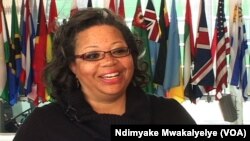Former U.S. Ambassador to South Sudan Susan Page says observers were "bracing for confrontation" in South Sudan months before the first shots in the year-long crisis rang out in Juba on December 15 last year.
"The cabinet was dismissed in July, the entire cabinet, and for anybody who studies politics or is involved in diplomacy, that's generally going to be the sign of some discontent," she told South Sudan in Focus in an interview.
"Then... the president dissolved most of the organs of the SPLM, the ruling party, and those organs then were in turmoil about what to do... I would say that people were bracing for some sort of confrontation. Obviously, we hoped it would not have been an armed confrontation," Page said.
In the days just prior to the start of the fighting, Page said tensions were running high in Juba. Among other issues contributing to the tensions was a military build-up in the city,
But Page remained in South Sudan at the height of the unrest in Juba.
People were bracing for some sort of confrontation. Obviously, we hoped it would not have been an armed confrontation.Former U.S. Ambassador to Juba, Susan Page
"We did advise American citizens to get out -- we put on lots and lots of evacuation flights -- and we drew down the number of staff to about as minimal as you can imagine," she said.
"But I felt it was critical that we maintain a presence and so I stayed with about five other staff members. We felt that staying open would send a message to everyone involved -- that we want peace to be achieved, we don't want the situation to get more out of hand. I do think it had an effect," she said.
The first shots in South Sudan's conflict were fired around midnight on Dec. 15 last year. Page said the following day "was the most worrying because the blasts were so loud and so close to the embassy."
Others have confirmed that Juba was rocked by what appeared to be mortar fire on the first full day of the conflict. On that day, the massive displacement of civilians also began, with many seeking shelter at U.N. bases around the country.
A year on, the fighting is still continuing.







